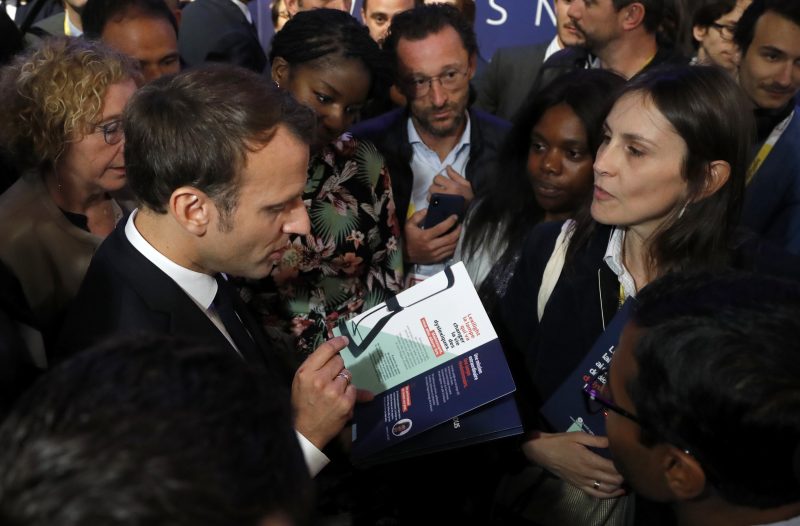African start-ups aim high, harsh realities temper hopes
French President Emmanuel Macron, left, at the Vivatech technology fair in Paris on Thursday. (Michel Euler)
Paris (AFP) – Cameroonian start-up boss Serge Boupda made a polished pitch Thursday to a room packed with potential investors in Paris, but he knows a solid business plan does not guarantee interest for firms hoping to unlock Africa’s vast economic potential.
Like other African entrepreneurs out in force at the Vivatech trade fair in Paris this week, Boupda acknowledged the challenges of entrenched poverty, corruption and terrorism that are holding back many countries.
“Africa is rising, yes, but it’s also 54 countries, so what that really means is 54 different challenges,” he told AFP after presenting his Diool payments app to a jury of three venture capital executives.
The recent surge in deadly jihadist attacks in Burkina Faso and Mali, for example, underscores the risks to Boupda’s ambition to bring Diool to those and other West African nations.
“Of course it’s something that’s going to affect my returns, but what sort of problems does terrorism represent? People are poor, and governments are struggling to be effective,” Boupda said.
“Insecurity doesn’t mean that business doesn’t need to be done.”
His enthusiasm was shared by Jack Ma of Chinese e-commerce giant Alibaba, who said in a keynote speech he was “amazed by the passion of young people” in Africa.
“They are talking about dreams, about the future, they have no fear,” he said.
A handful of African tech success stories has whetted investors’ appetites, like the M-Pesa mobile money transfer service app or Jumia, the pan-African e-commerce group that listed on the New York stock exchange in April.
African entrepreneurs often struggle to find the capital to finance their projects locally, making fairs like Vivatech a golden opportunity for finding deep-pocketed backers.
But for all of Africa’s potential, many venture capitalist have learned the hard way that pouring money into innovative firms and ideas is not always a recipe for success.
“We thought we had the tools, we had primarily African teams in place, and we crashed,” said Rebecca Enonchong, recounting how she tried to bring her US business services company Appstech to her native Cameroon.
“We failed at understanding the way people do business. It wasn’t about our technical offering… Africans need to interact with human beings, which we weren’t used to,” she said.
– ‘Lot of failures’ –
Mario Sander, the World Bank representative in Europe, told Vivatech attendees his agency is funneling millions of dollars into African ventures and organising mentoring programs for burgeoning entrepreneurs with tech giants such as Google.
“We felt we need to rethink traditional acceleration models… to prove that there are more African companies with the potential to become globally competitive than people think,” he said.
Sander cited the Tanzania health insurance start-up Jamii, which offers coverage for as little as $1 a month and recently raised $2.8 million in four financing rounds for its expansion.
The World Bank is now expanding into Francophone Africa, backing some 20 firms like the classified ads website Coin Afrique, which operates in around a dozen countries and has raised 2.5 million euros ($2.8 million).
Others agreed that African start-ups were still worth the risk for foreign investors, but tempered expectations for any hugh Silicon Valley-style payoffs.
“Ethiopia is going through radical reforms right now, and I think this is going to play a key role in propelling businesses,” said Caleb Meakins, who founded the start-up incubator Mella there.
However, “there’s a lot of failures and the chances of success are really low. It’s not like you can come in thinking you’re going to get rich quick,” he said.
– ‘African priorities’ –
Others cautioned that lofty projects might not necessarily gain traction in populations locked in the grip of poverty.
“You have to understand African priorities: If people have money, they don’t want to spend it,” said Tonje Bakang, founder of the Afrostream TV streaming service who now runs the start-up incubator The Family.
“And if they do spend it, it’s on financing education for their kids, they want to buy food — they don’t want to buy digital goods,” he said.
He advised investors to focus instead on firms offering services to businesses.
Others said the goal should be to entice people out of informal black-market economies by offering technologies that make it easier to do everyday things such as depositing a salary or paying taxes.
That is the vision for Diool, which has processed one million euros’ worth of transactions in Cameroon over the past two years, and is now seeking 1.5 million euros to expand.
“People in Africa have no problem buying a smartphone if you can use it to solve a problem that they normally solve informally — pay my mom’s rent, buy insurance, give them access to something,” Boupda said.
Disclaimer: Validity of the above story is for 7 Days from original date of publishing. Source: AFP.


